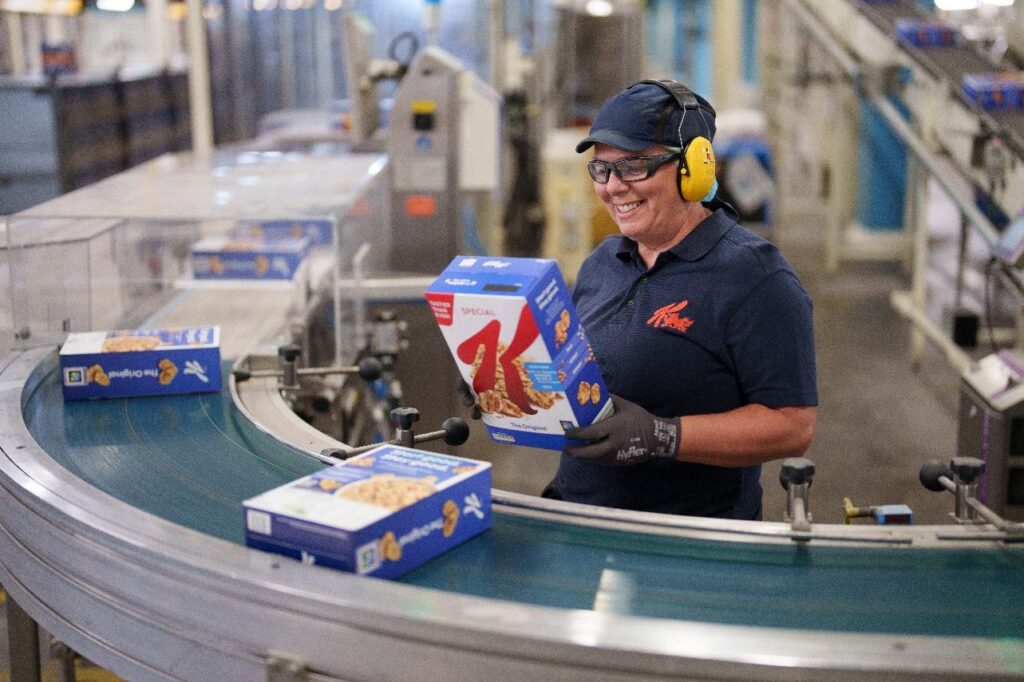In a strategic move set to revitalise its UK operations, Kellogg’s parent company, Kellanova, is spearheading a £75 million investment in its Wrexham factory.
This initiative not only aims to create 130 new roles but also offers a crucial employment pathway for staff affected by the impending closure of the Manchester plant.
Significant Investment Plan
Kellanova, the parent company of Kellogg’s, has announced a substantial £75 million investment in its Wrexham factory, North Wales. This investment is poised to create over 130 jobs, serving as a lifeline for employees impacted by the phased shutdown of the Trafford Park plant. By consolidating production in Wrexham, Kellanova aims to enhance operational efficiency and sustain its cereal manufacturing presence in the UK.
A New Chapter for Wrexham
The Wrexham factory, which began operations in 1978, is celebrated as Kellanova’s largest Special K plant globally. This site already produces well-known brands like All Bran, Bran Flakes, and Fruit ’n Fibre. The proposed investment signifies an expansion of its production capacity.
In addition to producing these popular cereals, the Wrexham plant will also manufacture Corn Flakes and Crunchy Nut, as production transitions from the Manchester site. The projected increase will potentially make Wrexham the largest cereal manufacturing location in Europe.
Impact on Employees and Local Economy
Kellogg’s decision to move production to Wrexham directly impacts the workforce. The closure of the Manchester plant by the end of 2026 has placed 360 jobs in jeopardy.
However, the new roles created in Wrexham offer a fresh opportunity for affected employees to continue their careers. The local economy is expected to benefit significantly from the influx of jobs and increased production activities.
The Wrexham factory’s expansion aims to accommodate the 350 existing colleagues, offering career development and stability in light of these changes.
Strategic Vision for the Future
Chris Silcock, Kellanova’s UK Managing Director, regards the investment as a pivotal commitment to the future of cereal production in the UK. By centralising operations in Wrexham, the company expects to achieve notable advancements in efficiency, quality, and sustainability.
Silcock emphasised the importance of investing in people, highlighting the creation of at least 130 new roles and plans to enhance facilities at the site.
Silcock’s vision is for Wrexham to remain a central hub for Kellogg’s cereal production, reinforcing the brand’s dedication to innovation and customer satisfaction.
Government Support and Regional Impact
The Business and Trade Secretary, Jonathan Reynolds, praised the investment, acknowledging the importance of Kellogg’s cereals to UK households. The commitment not only ensures continued production in North Wales but also creates skilled local employment, invigorating the regional workforce.
The potential economic benefits extend beyond job creation, contributing to the broader prosperity of the region. The increased manufacturing capacity in Wrexham is expected to stimulate further business opportunities and infrastructural developments.
This investment reflects the collaborative relationship between government and industry to secure economic growth and workforce stability.
Challenges and Prospects
The relocation of production presents challenges, particularly for Manchester-based employees facing job displacement. Transitioning the workforce and maintaining operational continuity is a key focus for Kellanova.
Despite these challenges, the strategic move promises to fortify Kellogg’s UK operations, ensuring a sustainable future for its cereal business. The Wrexham factory represents a forward-looking approach to meeting market demands.
The investment underlines Kellanova’s commitment to employing innovative strategies for sustaining growth, thus positioning the company as a leader in the cereal manufacturing industry.
A Future Built on Tradition
By centring production at Wrexham, Kellogg’s is not only preserving its legacy of producing beloved cereals but also paving the way for future advancements in the industry.
Kellogg’s £75m investment in Wrexham marks a transformative chapter, promising job creation and economic revitalisation. It signifies a forward-thinking approach to ensuring the sustainability of its UK operations.


